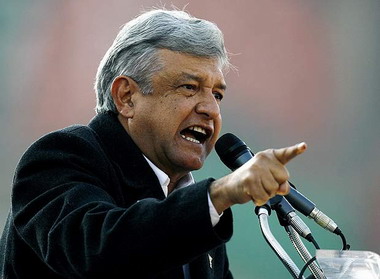As angry voters reject major parties, Mexico’s 2018 presidential race grows chaotic, writes political analyst Salvador Vázquez del Mercado…
Mexico’s 2018 campaign season has not officially begun, but the race for the presidency is already a nail-biter, featuring a powerful ruling party, dozens of independent aspirants – including two women – and very strange bedfellows.
In my two decades analyzing Mexican elections as both an academic and a pollster, I have never seen such a crowded and unstable presidential field this early on.
For years, the country’s three mainstream parties have seen falling support. Now alternatives are popping up left and right, fracturing old alliances and creating new ones. Sometimes, more options are good for democracy. Other times, they portend chaos.
So is Mexico’s democracy thriving or struggling?
Mergers and defections
The first sign of trouble in this presidential campaign season came on Sept. 5, when the leftist Democratic Revolutionary Party struck an unusual deal with a conservative rival, the National Action Party, and the smaller Citizen’s Movement. The three parties would join forces to run a single candidate under the banner of the so-called “Citizen’s Front for Mexico.”
While acknowledging that their coalition is ideologically incoherent, party leaders hope that the Citizen’s Front will seem like a palatable alternative to the ruling Institutional Revolutionary Party, or PRI – Mexico’s oldest political party. The beleaguered PRI, which has a 20 percent approval rating and has not yet nominated its candidate for 2018, denounced the Citizen’s Front as illegal and sought an injunction against it.
Reactions across the political spectrum were equally strong. Andrés Manuel López Obrador, a populist former Mexico City mayor and ex-member of both the PRI and the rival Democratic Revolutionary Party, denounced the Front as a stunt.
López Obrador, who is now making his third presidential run – this time as leader of the left-leaning Morena Party, which he founded after splitting from the Democratic Revolutionary Party in 2014 – is also angling for the anti-PRI vote. With the election still nine months away, this consummate insider rebranded as a disruptive outsider is currently favored to win.
Resistance to the Citizen’s Front was fierce even within participating parties. In one spectacular retort, Margarita Zavala, a 33-year National Action Party veteran and wife of former president Felipe Calderón, quit the party to run for president as an independent.
Zavala’s defection was unexpected but understandable….
By Salvador Vázquez del Mercado, Conacyt Research Professor, National Laboratory of Public Policy, Centro de Investigación y Docencia Económicas.
This article was originally published on The Conversation. Read the complete original article.
Disclaimer: This article contains opinions that are those of the writer and not necessarily those of The Yucatan Times.



